Joaquín Bau Nolla
| Joaquín Bau Nolla | |
|---|---|
|
| |
| Born |
Joaquín Bau Nolla 1897 Tortosa, Spain |
| Died |
1973 Madrid, Spain |
| Ethnicity | Catalan |
| Occupation | lawyer, politician |
| Known for | Politician |
Political party | Unión Patriótica, CT, FET |
| Religion | Roman Catholicism |
Joaquín Bau Nolla (Tortosa, 1897 - Madrid, 1973) was a Spanish Traditionalist/Carlist and Francoist politician.
Family and Youth
Joaquín Bau Nolla was born to a bourgeoisie Catalan family. His paternal grandfather ran a small chocolate manufacture in Tortosa. His father, José Bau Vergés, was an oil and vinegar trader and producer. He grew from a petty local merchant, transporting goods on his mules, to the owner of Aceites Bau S.A., a Tortosa-based company operating two factories, selling on the national Spanish market and exporting to South America, especially to Argentina. Following the commercial success, Bau Vergés built an imposing family residence in Tortosa; he was also honorary consul of Uruguay and Argentina, member of local business organizations and a Catholic activist. Joaquín's mother, María Cinta Nolla, was a stonemason's daughter. Both his parents were profoundly religious; politically his father sympathised with Carlism.
Joaquín had two brothers and a sister. Following his early education in Colegio de San Pedro Apóstol of the Hermanos de las Escuelas Cristianas in Tortosa he obtained his bachillerato in Colegio de la Bonanova de los Hermanos de La Salle in Barcelona, to complete military service in Regimiento de guarnición of Tarragona in 1921. Encouraged by his father, Joaquín passed commercial broker exams and later rose to president of Junta Central de Corredores de Commercio de España in 1935. In 1933 he commenced law studies and graduated from Faculty of Law of Universidad de Valencia in 1935. Married in 1920 to Pilar Elisa Carpi Esteller; the couple had 5 children.
Mayor
As a youngster and teenager Bau was active in the local Traditionalist juvenile organisations. He became head of the Tortosa section of Requetés, a formation established in 1909 as a sporting and outdoor grouping for the Carlist youth. He seemed particularly fond of social and charity initiatives, organising Christmas for the poor, working in Patronato Escolar Obrero de la Sagrada Familia and co-founding Sindicatos Católicos Obreros. Once Primo de Rivera replaced the liberal restauración with dictatorship Bau enthusiastically engaged in his Unión Patriótica, founding the local branch of the organisation and becoming its jefe provincial in 1924. In mid-1920s he was already recognized as a rising star in the local politics. This was acknowledged in 1925, when Bau was unanimously elected as mayor of Tortosa, to be re-elected in 1928. His term in office was mostly about tackling Ebro-related issues, like floods, navigation, bridges or land re-cultivation. Largely successful and sort of celebrated by Alfonso XIII and the dictator as one of the youngest mayors, he nevertheless failed in his attempt to elevate Tortosa - since 1833 part of the Tarragona province - to the provincial capital range. In 1927 he was appointed to the primoderiverista quasi-parliament, Asamblea Nacional Consultiva, becoming the youngest of its members.
Deputy
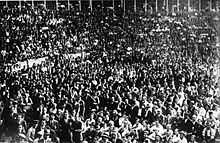
During the first years of the Republic Bau was accused of financial irregularities at the magistrate, though none of the charges raised against him has been conclusively proved. In the 1933 elections to the Cortes he successfully ran on the Traditionalist ticket from the Tarragona province, as a result emerging as one of key figures in the Levantine Carlism. Voicing his vehement support for the Catalan identity and traditional local establishments, unlike Tomàs Caylà and some other Catalan Carlists he has nevertheless opposed the autonomous statute as irreconcilable with the Spanish raison d'etat and sided with Francesc Cambó against the Catalan left of Lluís Companys.
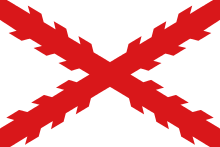
Following the death of Jaime Chicharro in 1934 Bau turned his attention southwards, leading the Valencian branch of the movement. In 1935, after the death of Bau's father, the family moved to Madrid; as a close friend of José Calvo Sotelo, Bau lived in the very same building. Far from the hardline intransigent Carlism, he had no doubts about mixing with the Alfonsinos. He took part in the alliances of Acción Española, TYRE and Bloque Nacional and possibly even considered some sort of dynastical fusion, though in Comunión Tradicionalista he remained in minority. In the 1936 elections he represented Carlism in the same Tarragona province; narrowly voted in he could have boasted a symbolic success, since he was the sole monarchist deputy from all the Levantine provinces. Shortly after the victory of Frente Popular became evident, Bau and Calvo visited the prime minister Manuel Portela Valladares urging him to call the military and rule by decree; this was probably the most tense moment in his career.
Commissioner of Industry

Bau was heavily engaged in the Carlist anti-Republican conspiracy, serving as a link to Renovación Española. Following the death of Calvo Sotelo he travelled to Portugal to negotiate final details of the rebellion with José Sanjurjo, personally witnessing the fatal crash of general's aircraft. Shortly after the Civil War hostilities broke out he travelled to Burgos in the Nationalist zone. Early September 1936 the supreme governing body of the rebels, Junta de Defensa Nacional, constituted Comisión de Industria y Comercio, a substitute for Ministry of Economy, and named Bau one of its seven members. A month later the newly established Junta Técnica del Estado replaced it with Comisión de Industria, Comercio y Abastos with Bau appointed its president, the de facto minister of trade and industry of the Nationalist zone. The new body resided in Burgos.
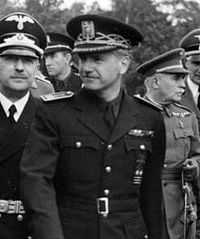
The primary tasks were to keep production running in spite of the broken national trade market and to build the gold deposit reserve of the Nationalists. He was subsequently involved in the currency reform, first organizing the stamping of pre-War notes and then arranging for a new Nationalist peseta to be printed in Germany. Having set the priorities, the next objective was to control foreign trade and direct the flow of deficient components accordingly, which was attempted by numerous regulatory means; at that time Bau considered himself an advocate of the "directed" economy. He spoke in favor of rapid industrialization, declaring respect for private property, though within the limits of social usefulness. He was heavily involved in dealings with the semi-official Nazi companies, HISMA and ROWAK, though key decisions were clearly beyond his capacity.
Bau unconditionally accepted the unification of Communión Tradicionalista and Falange in 1937, but his influence started to decline once Ramón Serrano Suñer made it to the Nationalist zone. The conflict was sparked off when Franco decided that it would be the family of Bau, not this of Suñer, to be exchanged with the Republicans for the family of general Miaja. The animosity grew when Bau, still holding to his Carlist outlook, opposed totalitarian designs pursued by Serrano. As a result, when the first regular Francoist government was created early 1938, Bau was not even considered.
Off duty
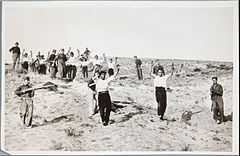
Embittered with Serrano Suñer but also with Franco, in the spring of 1938 Bau left Burgos and great politics for private life in his temporary residence in San Sebastián. At that time he was supporting financially and logistically the Catalan requeté battalion of Terç de nostra senyora de Montserrat; also remained engaged in numerous charity projects, the key one having been Auxilio de Invierno, a social welfare scheme clearly imitating the Nazi Winterhilfe. The most important of Bau's ventures of that period was probably helping the Catalan Republican soldiers kept in the Nationalist prisoner of war camps. Personal acquaintance of officers commanding Campos de Concentración and Comisíon Clasificadora, Bau did his best to release as many prisoners as possible and to get them enlisted either in the Carlist tercios or in the Falangist banderas. Following the Nationalist conquest of Levante and the end of the war, he returned to Tortosa. In the 1940s Bau dedicated himself to business (multiplied his wealth by trading shares of Banco de Tortosa), family issues and various Catholic organizations, pursuing also his interest in organ music. By virtue of his Francoist assignment in 1937-1938 considered disloyal by the Carlist regent-claimant Don Javier, he maintained only loose relations with the mainstream Traditionalism. In the leaflets distributed in Tortosa the Carlist youth accused him of ignoring the lot of requetés detained by Francoist administration.
Francoist dignitary
In the mid-1950s the Francoist regime was stalled on the crossroads; finally the dictator shelved totalitarian plans of José Arrese and opted for a more hybrid line of development. As a result the year of 1958 produced huge turnover of the procuradores nominated to the francoist quasi-parliament, Cortes Españolas. The change affected Joaquín Bau as well; Franco appointed him member of the Consejo Nacional of the Falange, which automatically ensured the Cortes mandate. As his career was re-launched, Bau kept assuming higher and higher posts. In 1963 he started leading various parliamentary committees, formally nominated president of the internal affairs committee in 1964, president of Leyes Fundamentales committee in 1965 and then other committees working on new constitutional laws. In 1965 he was appointed president of Consejo de Estado (re-appointed in 1971), a consultative body deprived of any power and functioning as a prestigious perk; this automatically produced his nomination to Consejo del Reino, another body with some theoretical competencies related to monarchical establishments. In 1970 Bau was nominated its vice-president. Two days before his death he was made Conde de Bau.
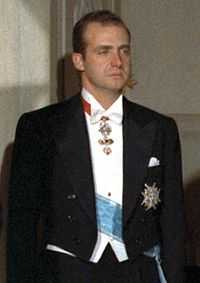
Bau's rise from political non-existence to president of Consejo de Estado in just 7 years was possible as he proved acceptable to most groupings competing for power within Francoism. Deprived of own political background he posed no threat and might have been considered as sympathetic to their cause by Carlists, monarchists, technocrats (by virtue of his business activities and friendship with López Rodó), the Church and even the military (maintained friendly relations with many high-ranking generals). Bau boosted his career by skilled and silky presiding style in numerous bodies of the regime, excelling in conflict management and demonstrating impartiality, combined with perfect loyalty to Franco.
Bau's own political outlook may be summarised as a watered-down authoritarian monarchism based on diehard (marchamartillo) Catholicism. Considering himself Traditionalist of the lowest common denominator, in the 1950s he joined the juanistas and recognized Don Juan as the legitimate claimant, though he acknowledged that there was no return to the liberal monarchy and the future kingdom must encompass some structures created by Francoism. Far from political militancy, starting mid-1960s Bau began to press the monarchical solution (against the regentialist faction) by advocating adoption of Ley Orgánica, gradually switching allegiances from Don Juan to his son, Juan Carlos.
Legacy
Joaquín Bau is commemorated by a very short street in Madrid, a parking-lot-plaza in the Ferreries district of Tortosa and a long backyard drive in the resort town of Benicasim, where the family owns a summer residence. No trace of Bau having been named "hijo predilecto" of Tortosa in 1966 can be found on the official ayuntamiento web page. Since the Francoist times one of Tortosa colleges remains named "Institut Joaquín Bau", though there was a failed attempt to change the patron in 1983. The biography was published in 2001, in large part a hagiographical compilation of his correspondence and private archive.
See also
References
- Martin Blinkhorn, Carlism and Crisis in Spain 1931-1939, Cambridge 1975, ISBN 9780521207294
- Manuel Martorell Pérez, La continuidad ideológica del carlismo tras la Guerra Civil [PhD thesis], Valencia 2009
- Manuel Martorell Pérez, Retorno a la lealtad; el desafío carlista al franquismo, Madrid 2010, ISBN 9788497391115
- Joaquín Monserrat Cavaller, Joaquín Bau Nolla y la restauración de la Monarquía, Madrid 2001, ISBN 8487863949
External links
- Bau on Geneallnet
- Bau in the Catalan encyclopaedia
- Historical Index of Deputies
- Carlism 1931-37
- Carlism struggling to preserve identity under Francoism
- list of Catalan deputies
- Bau college official site
- Carlisme Catala (contemporary propaganda) on YouTube
- Terç de Montserrat roll of the dead video (in Catalan) on YouTube